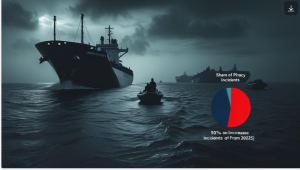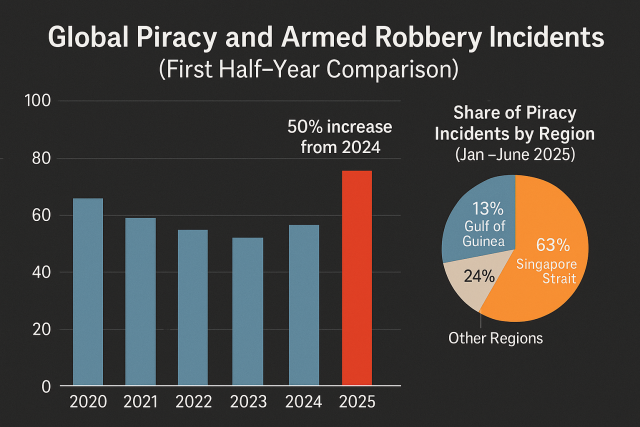From Kamrul Islam, Chattogram: Piracy and armed robbery at sea have surged at an alarming rate along key international shipping lanes in the first half of 2025, according to the latest report from the International Maritime Bureau (IMB) of the International Chamber of Commerce (ICC). The most concerning hotspot: the Strait of Singapore, a strategic route for global trade. In contrast, the once-notorious Somali coast has reported no new incidents since April.
From January to June 2025, 90 piracy and armed robbery incidents were recorded globally—a 50% increase compared to the same period last year. This marks the highest number of such incidents in a half-year period since 2020, the IMB notes.
Of these, 79 involved armed robbery onboard ships, six were attempted but unsuccessful, while four vessels were hijacked, and one reported gunfire. The safety of crew members remains a serious concern, with 40 seafarers taken hostage, 16 kidnapped, and three physically assaulted.
 The Strait of Singapore, one of the busiest and narrowest international sea lanes, accounted for 57 of the total 90 incidents—a staggering 63% of global maritime attacks. This figure is a steep rise from only 15 cases during the same period in 2024.
The Strait of Singapore, one of the busiest and narrowest international sea lanes, accounted for 57 of the total 90 incidents—a staggering 63% of global maritime attacks. This figure is a steep rise from only 15 cases during the same period in 2024.
Maritime security analyst Capt. Habibur Rahman (retd) tells BusinessToday24,“What makes this spike especially troubling is that many of the targeted ships are very large bulk carriers, often over 150,000 DWT (Deadweight Tons). The narrow and congested nature of the Singapore Strait makes these vessels highly vulnerable to boarding attempts. We’re seeing an estimated 95% success rate for pirates once they launch an attack in this zone.”
Of the 57 incidents in the Singapore Strait, 34 involved firearms or bladed weapons, posing grave danger to crew members.
IMB Director Michael Howlett warns:“The Strait of Singapore is responsible for nearly 30% of global seaborne trade. This spike in attacks is extremely concerning, jeopardizing not only the safety of crew but also the stability of international supply chains.”
Although piracy in the Gulf of Guinea has declined, the IMB still reports 12 attacks in the first half of 2025, keeping the area on high alert. “The threat is no longer widespread but remains unpredictable,” says Nigerian maritime security expert Ifeanyi Okonkwo, who believes that regional coordination has improved, but coastal surveillance gaps remain.
In contrast, the Somali coast, once considered the global epicenter of maritime piracy, has not seen any attacks since April. However, the IMB cautions that the risk could return once the Southwest monsoon winds subside, a period historically favorable for pirate activity in that region.
The IMB urges all vessels and seafarers to exercise maximum vigilance while transiting high-risk zones and to strictly follow the latest Best Management Practices (BMP 5) to mitigate threats.











